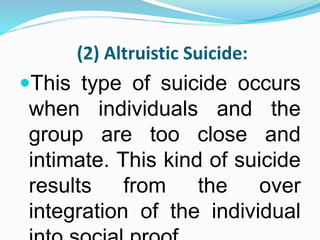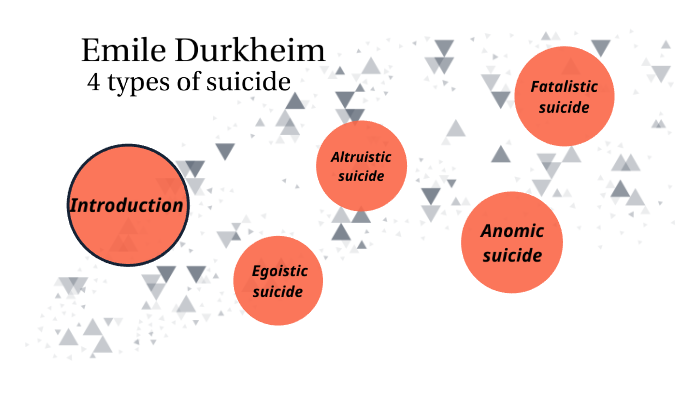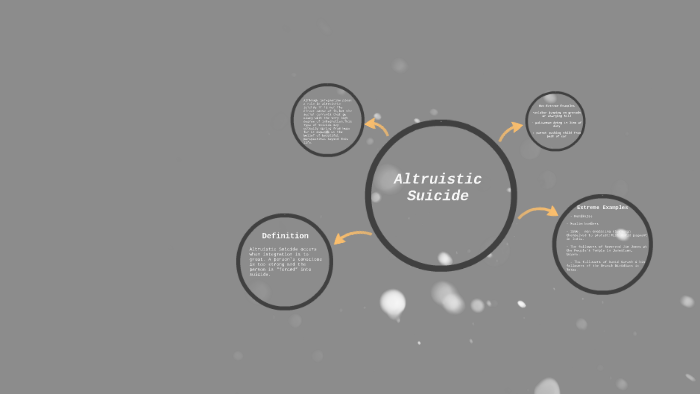Altruistic suicide refers to the act of ending one's own life in order to benefit others, either directly or indirectly. This can take the form of sacrificing oneself for the greater good, or as a way of relieving suffering for oneself and others. Altruistic suicide has been a topic of philosophical and moral debate for centuries, with some arguing that it is a selfless and noble act, while others view it as selfish and irresponsible.
One argument in favor of altruistic suicide is that it can be a way to demonstrate selfless love and compassion for others. For example, a soldier who throws themselves on a grenade to protect their comrades could be seen as engaging in altruistic suicide. Similarly, a terminally ill person who ends their own life to avoid causing suffering for themselves and their loved ones could be seen as engaging in altruistic suicide.
Another argument in favor of altruistic suicide is that it can be a way to alleviate suffering for oneself and others. For example, a person who is suffering from a terminal illness or a chronic condition that causes extreme pain and suffering may choose to end their own life as a way of escaping this suffering. Similarly, a person who is trapped in a situation where they are unable to escape abuse or violence may choose to end their own life as a way of ending their suffering.
However, there are also strong arguments against altruistic suicide. One argument is that it is fundamentally selfish, as it prioritizes the needs and desires of the person committing suicide over the needs and desires of others. This can be particularly problematic if the person committing suicide has dependents, as their death can cause significant suffering for those left behind.
Another argument against altruistic suicide is that it can be irresponsible, as it may not actually solve the problems it is intended to address. For example, a soldier who throws themselves on a grenade to protect their comrades may not actually be able to save anyone, and may simply be sacrificing themselves for no reason. Similarly, a terminally ill person who ends their own life may not actually be relieving suffering for themselves or others, and may simply be ending their own life prematurely.
In conclusion, altruistic suicide is a complex and controversial topic that raises important moral and ethical questions. While it can be seen as a selfless and compassionate act, it can also be viewed as selfish and irresponsible. Ultimately, the decision to engage in altruistic suicide should be made with careful consideration of all of the potential consequences, both for oneself and for others.
Sinister

Willing to be killed to save your boyfriend or girlfriend during an attack is a form of altruistic suicide. New York: Paraview Pocket-Simon and Schuster. We argue that importing the paradigm of altruistic cell death from multicellular organisms to explain active death in unicellular lineages has the potential to limit the types of questions we ask, thus biasing our understanding of the nature, origin, and maintenance of this trait. We also emphasize the need to distinguish between the benefits and the adaptive role of a trait. Lecture Notes in Computer Science. Barry 1 January 1996. Emile Durkheim classified different types of suicide, including egoistic, altruistic, anomic, and fatalistic.
Altruistic suicide: precedence in usage

As with integration, suicide rates tend to increase when there is too much regulation. It is a self-defeating act as you are demoralising an already demoralised society," says Dr Rangarajan. Altruistic suicide occurs when a person dies by suicide for the benefit of other people. Durkheim had an important impact on the development of sociology. Altruistic suicide is best known in the context of programmed cell death PCD in multicellular individuals, which is understood as an adaptive process that contributes to the development and functionality of the organism. Due to industrialization, France was going through major technological, economic, and religious changes. Emile Durkheim's Theory of Suicide Emile Durkheim defines suicide as any form of death emanating from the victim's actions, which may be negative or positive, while fully aware it will yield this result.
On the paradigm of altruistic suicide in the unicellular world — Experts@Minnesota

At the same time, consciousness is controlled by individuals in their different actions. There is no one reason why a person commits suicide, a lot of things have to go wrong for it to happen," she says, adding that it is usually is a combination of proximal and distal factors, which would include neuro-biological causes, early childhood neglect and trauma, witnessing violence, family history of mental disorder or alcoholism. These elements bind or bring people together and create a desired social integration. However, suicide is more than just a medical condition. The new data showed that this lethal combination is also held in check by a signaling system that bacteria use to sense their population density. This concept was thought of as normlessness, Durkheim believed that once the factor of normlessness was gone you may fall into anomie. Little, 2012 The authority of the Catholic Church weakened and there was a shift from a traditional to modern society.
Altruistic suicide

Sociologist Emile Durkheim classified suicide into four types - egoistic when the level of social integration is low and the person does not feel they belong to society , anomic happens during times of great stress or change, such as losing a job or a loved one , altruistic where the person is so integrated into society or with a particular cause that they don't give importance to the individual and fatalistic occurring in social conditions where the individual experiences pervasive oppression. Integration Durkheim had a view that society controlled people with a powerful force. Finally, fatalistic suicide occurs due to strict measures in society. AU - Durand, Pierre M. Also, soldiers willing to take a bullet for the nation are altruistic suicide. However, there is a lot of the factors behind these horrifying events that actually are more sociologically related. In Mayers case, she felt separated from others and society itself.





